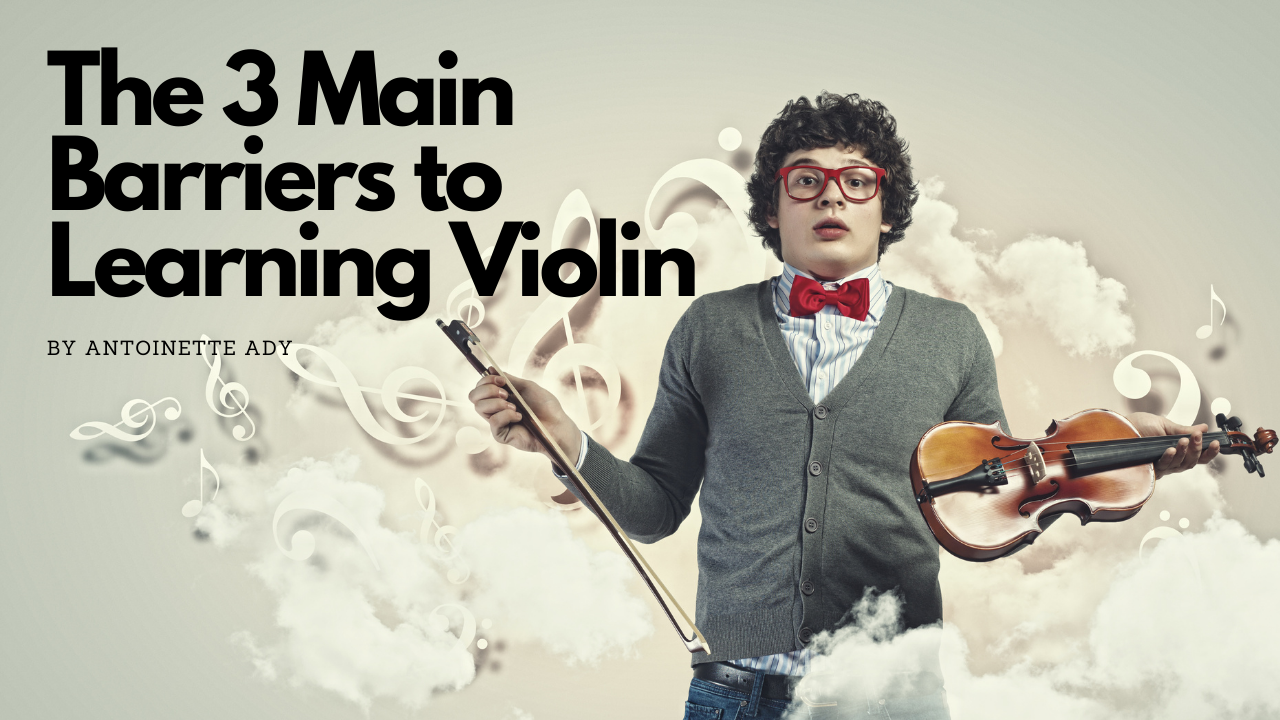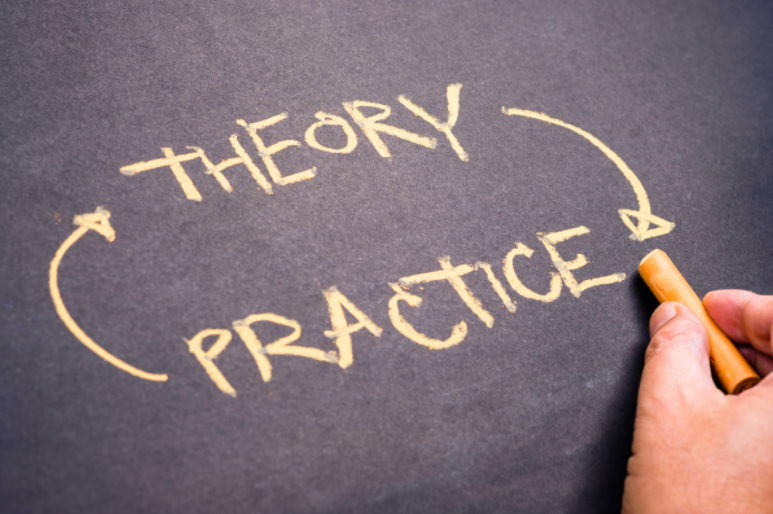The 3 Main Barriers to Learning Violin
May 12, 2021
When you are starting to learn the violin for the first time, or you have tried this before, I want to ensure your success by explaining why students fail at the violin (and any other subject they study).
It could seem like there are a lot of reasons one could fail at a subject. The thing is, when we really boil it down to the basic, fundamental truth of the matter, it does happen to come down to these 3 points that I'm about to discuss.
Not to say that life is not a factor to consider. It is, for sure. No doubt about it. If there's anything we've learned over the past year and a half, it's that life can throw us some completely unexpected curve balls. Sometimes it's not even a ball. Sometimes it's a sharp smack in the face or sometimes it's just a bucket of "what the heck is happening" poured all over your life. But that's ok. The point I'm trying to make is that learning something doesn't have to add to that "what the heck is happening" feeling. There is a way to pull yourself out of that confused, frustrated, angry, I don't know what's going on feeling when you're trying to learn something new, whether you're adulting for the first time and are trying to learn how to do your taxes or you are learning to play a musical instrument like the violin. The following 3 points are the things you need to look for and fix ANY time you are having trouble learning something. I'm going to be talking here about how they relate to violin specifically (I'm a violin teacher, after all), but do consider how you might be able to apply these to other things as well. It just might save you some time and mental sanity.
#1 Not Being Taught Any Music Theory

My training was a perfect example of this. I was trained mainly on the Suzuki method and I am sad to say it wasn’t until years later that I could actually read sheet music. This was frustrating to me at the time, because I couldn’t pick up any new piece of music and read it. I always had to listen to it first, or else I couldn’t play it.
I’ve also seen the opposite scenario where I’d have a student come in who said he’d read the whole Violin for Dummies book but had never actually tried it on a violin. Needless to say, he had to start from scratch all over again.
The Solution:
In my classes, I put a good deal of focus in on making sure the student is able to perform the right technique AND understand why they are doing it. You could call this a proper balance of practice and theory. If the scales are tipped too heavily in one direction, the student is uncomfortable at best, and angry, frustrated and willing to give up at worst.
Don’t let a bad teaching method get in the way of your progress. Sign up for my class today and get the best of both worlds!
Next up...
#2 Starting In Way Too Hard

What is the best way to learn? Get the hardest thing out of the way first, then do the easy stuff later? Or start easy, and build it up?
When you learned math for the first time, you learned addition and subtraction before you learned multiplication and division. Why is that? It's not just because it's easier. It's because one ties in to and is a foundational concept to the next step along the ladder. If I asked you to climb a ladder, but took out the first 2 rungs, I wouldn't be setting you up for guaranteed success, would I? You would probably find a way, if you were determined, but if you took 100 people and asked them to do the same thing, a lot of people would quit before they made it very far.
Yet this is actually quite common with teachers, as it is with the Suzuki method.
Suzuki had his heart in the right place. In Japan, they had a very strong musical education program in the schools, so when Suzuki introduced his rote-style violin teaching program to children, it caught on like wildfire. Not only were kids learning how to play violin, there was also a focus on developing as a person, building character, learning about goal setting, time management and overall discipline. This method has a whole lot of positives for little kids.
But when it comes to translating this method to adults, the results are not the same. Adult students who came to me from Suzuki programs complained of boredom, and of the class feeling over their head at the same time. Why is this? I'll tell you exactly why.
Nobody ever taught the adults what the sheet music was saying. They learned how to play the first variation of Twinkle, Twinkle, but they had no idea what the printed sheet was talking about. Multiply this times 8 weeks and you've got a bored student who can play Twinkle, but isn't having very much fun and who feels like they still don't understand what the sheet music is telling them to do. (It is completely ignored as anything other than a point of reference while playing.)
Why didn't the teacher explain the sheet music? Because it's way too hard! I never start any of my students on Suzuki Book1. To continue our math analogy from earlier, it's like starting someone's math training with long division. While you can make them memorize certain answers, unless they understand all the earlier math steps, they are never going to understand how they got to that answer. And they are never going to be able to do it again on their own in even slightly different circumstances.
And that's what I want to drive home: it's easy to understand music, if you start with something that's actually easy to understand.
Have you ever had a friend who speaks another language and you say, "Teach me something!" Then they spew an entire sentence at you and your head immediately starts reeling? That is a perfect example of this barrier. You've got to back it up. Learn one word at a time before trying the entire sentence.
Remember, if you're building a house, you first must build the foundation, then the 1st floor, then the second floor, and so on. You can't just start anywhere and expect to have a solid foundation going forward. This applies to any and every subject! Learn the easy stuff first, then progress on to the harder stuff.
Going Way Too Slow, For Too Long
This can also go the reverse direction where you are moving WAY too slow for somebody's level of comprehension. Like when violin teachers require the song to be perfect before moving on to the next one. This is another real teaching technique in Suzuki, and one that is setting adult students up for weeks if not months of boredom and frustration. While some students do need some extra time on certain songs and exercises, not everyone learns at the same speed.
A better solution, in my opinion, and experience, would be to get the song as good as you can get it, for the level you are at. It would be crazy to expect that a 1-month old violinist is going to sound like the 30-year old violinist with several more weeks of grinding away.
The Solution:
My classes, based on my book Absolute Beginner Violin Method Book 1, start out easy and gradually introduce harder and harder material once you’re ready to move on. The way the book is set up, it is impossible to fail.
Even without using my book, in any field of study, you must approach the easiest or more foundational thing first. Then, once you understand that, you can build upon it and increase the difficulty level.
How do you know if you’re starting easy enough? The main test would be simply, do you understand it? Or is it way over your head. If you are feeling extremely frustrated and lost, it is probably way over your head. More on this in the next barrier.
#3 Not teaching you what the symbols and terms mean
Though I’m giving this last, this is actually the most important barrier. It requires special attention.
I know it seems like I’m picking on Suzuki, but really they are just the most widely known method. My problem with Suzuki is they never take the time to explain the sheet music to you.
If Suzuki used no sheet music and had you learn solely by ear, I'd support them 100%. But instead, they throw a piece of sheet music at a 5 year old, a 10 year old a 40 year old, and they tell them to play it. IN WHAT WORLD would a newbie have ANY idea what they are expected to do?
I speak here from personal experience. I grew up with two older brothers and my dad in the household. During summers, I would take my Mad Libs and my violin and we would go deep into upstate NY to my grandparent’s Bed & Breakfast where I would spend the day roaming the lake, being scared of spiders and borrowing my dad’s Swiss Army knife to whittle away at sticks. My dad seemed to use his Swiss Army knife for everything, and my brothers followed suit and I remember thinking, “I want a Swiss Army knife!” I was probably only about 9 at the time. I told my dad. He thought about it, and probably knowing it wouldn’t happen for quite some time said to me, “Once you learn how to read sheet music, I’ll get you one.”
I didn’t know how I was going to read sheet music, but I knew I was bound to if I kept playing violin. Now that I am fully trained as a teacher, I can see the answer so clearly, but back then, I just figured if I persisted long enough, it would eventually make sense.
Only, that logic was flawed.
Years passed and, like everyone else in the school orchestra, I could follow finger numbers and play when everyone else played. I could listen to something, and with the sheet music in front of me, I could associate certain finger numbers with where the dots were on the page, and I could play what I was hearing. After about 3 or 4 years, I realized I was doing this all quite readily, and I figured, “Hey, I’m reading sheet music!” So I told my dad and he got me the knife just like he promised.
But, there was something I couldn’t do. I couldn’t pick up a new piece of music and play it without hearing it. One time my uncle was trying to get me to be creative, and he told me to play the music backwards. I couldn’t do it. Looking at slightly harder music was like looking at Greek. “I don’t know how this goes” is what I thought was the problem when looking at something new and unfamiliar.
It was then that I realized I don’t know how to read sheet music. And I’m not alone. Every Suzuki kid I have come into contact has said the same thing to me. “I can play the Suzuki songs by heart, but that’s about it!”
And there is one very precise reason why.
I didn’t know what the symbols meant, and I didn’t know what all the terms meant.
My uncle, seeing the gaps in my musical education offered me this great workbook, Practical Theory Complete. Finally, all of the symbols I had been reading all those years made sense for the first time! Being able to clarify what was happening on the page broadened my understanding immensely. Now I was able to understand and describe all the things I had already been doing for years!
Why was this important? Why not just keep robotically playing the Suzuki recordings forever? For one, I wouldn’t grow as a musician. Secondly, I would be lost in conversation with other instrumentalists, for example, guitarists leading a small rock music cover band. Third, I would be just that. A robot who can follow instructions but can never think for myself.
So while playing Twinkle, Twinkle by memory is fine, wouldn’t you rather play anything you see, hear, or can think of creating? That is my mission, and that is how I start new violinists on the path to learning, saving them years of time on their journey as a musician.
In Conclusion
So there you have it. This boils it down to a pretty basic 3 part checklist you can run yourself through any time you feel like you don't know what's going on:
1. Do you actually have a balance of understanding what you are doing versus the ability to do what you are doing? If not, get more understanding, or practice the mechanics more, whichever one is lacking.
2. Is what you are learning at your level? If you feel like you were going along fine and then hit something that makes you feel overwhelmed, chances are you need to break it down into easier, more bite-sized steps. It doesn't mean you're dumb. It just means what you're trying to do is too hard for where you are at right now. Don't take it personally.
3. Look over your music, or what you're reading. Are there any symbols, words or phrases you don't know? Anything that makes you feel like you don't know what you're reading? Look it up. Google is wonderful. Our Adult Violin Students FB group is also wonderful (post your questions any time, by the way).
If you've ever felt like you wanted to quit playing the violin or it's too hard, or you're having a day where you feel discouraged, don't give up. Put the instrument down for a few minutes, take a deep breath and a step back, and remember, we're all in this together.
Just because learning the violin is challenging doesn't mean it has to be confusing or overwhelming. You got this. Now go practice :)


